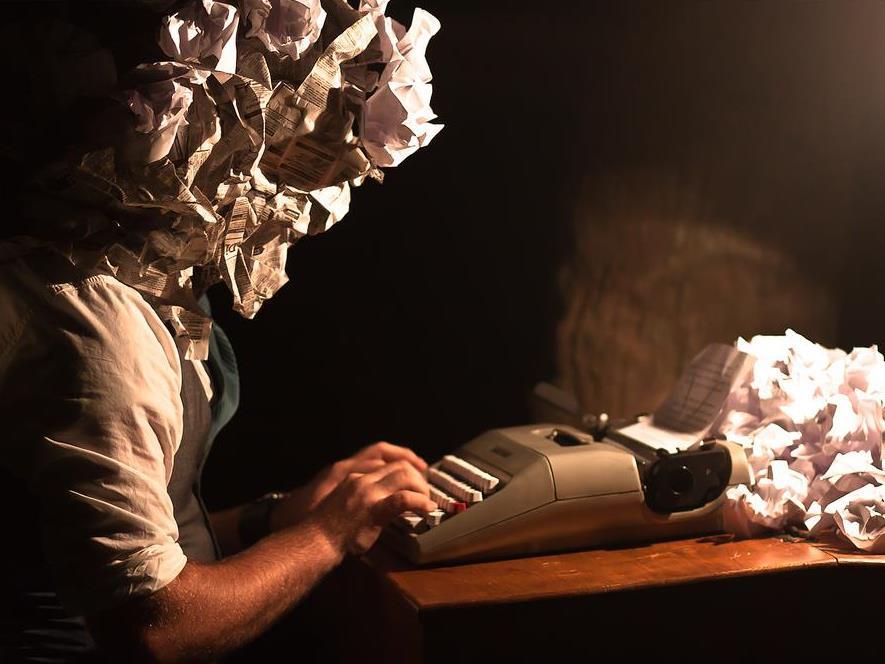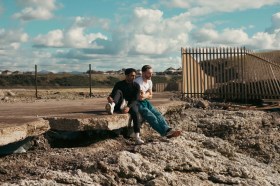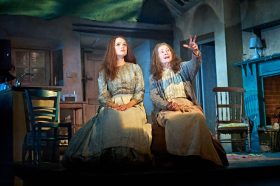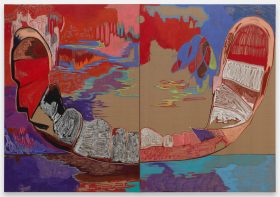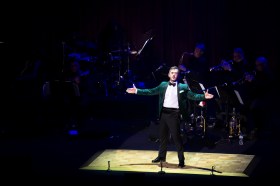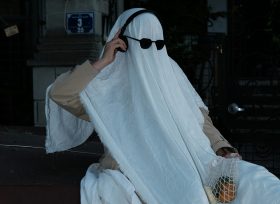Image: en.wikipedia.org/wiki/Writer’s_block
Literary festivals are in flux as they rejig the festival format, diversify content and experiment with online programming. The new formats can provide local and international audiences with improved access to the literary scene and writers with a direct communication line to their audiences – and potential audiences.
But without serendipitous human interaction, how does an aspiring writer negotiate the online environment?
Comprised of an online only program, the second annual Digital Writers’ Festival (DWF) aims to ‘challenge your perceptions of literary festivals’ and take live-streaming to the next level.
Festival Director Connor Tomas O’Brien told ArtsHub, ‘We’ve tried to dissect different ways in which events can’t take place at physical writers’ festivals. In terms of the specific events, it’s about doing interesting things to create the kind of events that couldn’t take place anywhere else and I think that’s where it gets really interesting,’ he said.
From Digital Dinner Parties to online Show and Tell, the DWF is a feast of literary treats. But without a physical destination, or canapés and premingling, how do you get the most out of an online event? We’ve compiled a guide to ensure you enjoy all that a digital event has to offer.
Make the most of enriched accessibility
With just an internet connection as the barriers to entry, an online festival is able to push past any physical limitations to program a series of events that couldn’t take place in any other format.
Hosted by the Emerging Writers’ Festival, the DWF has overcome conflicting time zones and programming headaches to offer an ‘international roster of artists expanding our ideas of digital – and analogue – writing’.
Accessibility is the essence of the online festival format as it breaks down many of the barriers that may preclude people from attending events in physical spaces.
‘The entire writers’ festival is accessible to people that for different reasons wouldn’t be able to attend physical festivals,’ said O’Brien.
To assist audiences, the DWF has introduced a ‘pay as your wish’ fee structure to ensure all members of the local and international literary community have access to a variety of events.
Be active on social media
Unlike a physical festival where there is an emphasis on participants, panelists and organisers connecting and networking, by nature the format of an online festival does not lend itself to spontaneous connection or chitchat with the person next to you.
‘That’s probably the most challenging component of it, just knowing there are people all around the world that are going to be participating in these events that we have never met,’ said O’Brien.
But this can be overcome with reaching out on social media to help simulate the networking experience online. Tweeting about the event, reaching out to other participants, sharing your opinion, feedback and learnings can help build your profile and enhance your festival experience.
‘Attending multiple events in an active way really cements those audience members as the people who are really participating and shaping the conversation around the festival,’ said O’Brien
O’Brien told ArtsHub the writers that were active audience members last year have gone on to participate in offline events and programs at the Wheeler Centre, Emerging Writers’ Festival, or gain residencies.
‘Demonstrating that you are really interested in participating in these conversations is a way to demonstrate that you actually want to be a part of that community,’ said O’Brien.
Break the barriers of festival cliques
For the less gregarious writerly folk among us, festivals can be an intimidating affair as rooms become abuzz with conversation and you wonder if everyone knows everyone on the planet except for you.
Online festivals can offer an entry point into the literary community without the sweaty palms. In the convenience of a living room, participants can mingle with writers from across the globe and interact with workshop hosts and locals.
Organisers of the Digital Writers’ Festival told ArtsHub this ability to connect in a comfortable environment was one of the highlights from last year’s festival. ‘That was one of the most exciting or unexpected things that came out of last year’s festival,’ said O’Brien.
‘A lot of audience members felt that coming through the Digital Writers’ Festival was a way to break through that perception of cliques … which may have been at least one reason why they felt uncomfortable at different real world festivals’.
Go on a global adventure
Last year, the DWF pushed international borders by running a series of events in partnership with UNESCO Cities of Literature whereby representatives contributed to a digital conversation about how these different cities of literature across the world were working.
‘That was obviously something that was absolutely impossible in the sense that you would never be able to get all of these people from these different cities in the one place at one time,’ said O’Brien.
This year, in partnership with UNESCO Cities of Literature, online festival participants can follow in the footsteps of emerging writers around the globe.
From Reykjavik to Iowa, using smart phones writers take participants on a literary tour of their city, answering questions and taking directions along the way.
Pick an intimate and participatory event
With 30 events spanning across twelve days featuring everything from the ‘playful and participatory, transmedia and transcontinental’, it can be difficult to decide which online events to attend.
For those looking for participatory events, O’Brien recommends events which include a video chat component with the artist or workshop host.
Innovative events such as Digital Dinner Parties – whereby eight audience members join food writers to create a cross continental feast from their own kitchens – use videochat to instruct and connect audiences as they prepare a simple meal later enjoyed of a discuss ion of literary culinary culture.
‘I think if people are really interested in having the most engaging experience those are the ones to jump in and participate in …. Because they are intimate, masterclass style events,’ said O’Brien.
Digital Writers’ Festival will run from 11-22 February at digitalwritersfestival.com. To view the events, click here.
